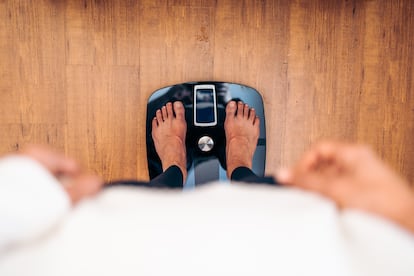Menopause doesn’t make you as fat as you thought
Although many women gain weight at this stage of life, this usually has more to do with physical activity, emotional state and lifestyle than with the condition itself

Every time a new year starts, countless people – many women among them – start new routines with the aim losing weight. And while the approach should ideally revolve around a change of habits to improve well-being and quality of life, losing weight as a consequence of those changes, the truth is that many women are still obsessed with the number they see on the scale.
Many middle-aged women blame their weight gain on the menopausal transition process. It is not uncommon to see women between the ages of 45 and 55 who suddenly find themselves with 25 extra pounds. At least “suddenly” is the term they choose to use in consultation — but this is not something that transpires overnight. What is actually happening is somewhat more complex, involving a series of simultaneous events that raise the risk of increasing the amount of body fat during this stage.
First, there is the perimenopause, which takes place in the years prior to menopause and is characterized by a series of symptoms such as hot flashes and sleep, mood or genitourinary disorders, to name a few. Perimenopause is often the first to be blamed for the weight gain. However, studies show that, on average, women tend to gain 4 to 7 pounds during the transition to the menopause, although the number varies a lot depending on the case.
A lack of estrogen leads to an increase in body fat, but also to a decrease in muscle mass, so weight itself does not really change much. What does take place, however, is a redistribution of body fat. Before entering perimenopause, body fat is distributed mainly in the subcutaneous area of the buttocks and hips; while postmenopausal women tend to have a greater amount of total fat, a higher percentage of fat overall and an accumulation of fat in the abdomen.
Lower calorie expenditure
The effect of aging on weight can be noticed from the age of 30. This is when a progressive decrease in muscle mass begins to take place, which translates into a lower basal metabolic rate; having less muscle, women burn fewer calories at rest.
Changes in age also lead to a decrease in physical activity. It can be subtle, barely noticeable, but this has an accumulated effect on energy expenditure, because exercising or moving less affects muscle mass, reducing its proportion and contributing to the decrease in the basal metabolic rate. All of this results in an increase in body fat.
This is why regularly scheduled physical activity is key to maintaining muscle mass in women. Curiously, the percentage of women with a sedentary lifestyle increases after 35 years of age; half of women between 45 and 64 do not practice any physical activity at all.
Most of the scientific literature produced to date supports the theory that weight gain in mature women is mainly due to their increasing age and lifestyle changes, and that the drop in estrogen caused by menopause itself does not produce significant weight gain after adjusting for age.
Another relevant factor that can contribute to the increase in body fat during the transition to menopause are the sleep disorders which are characteristic of this stage. In addition, if the hot flashes and night sweats are recurrent, the lack of rest can cause an increase in fatigue and a decrease in physical activity, whether spontaneous or programmed.
Emotional instability is another symptom of the transition to menopause. Mood swings can interfere with the adoption of healthy habits and contribute to weight gain, either by using food as an emotional outlet or by not finding the motivation or desire to exercise or eat healthy food.
It would seem that a mature woman faces a losing battle when it comes to maintaining her weight within a range that allows her to live with good health and quality of life. However, achieving a healthy weight is possible through a multifactorial approach to weight loss management: diet, physical exercise and psychological support to make it easier to change habits.
For all these reasons, it is important to become aware and consciously adjust both diet and physical activity, understanding the changes that occur in the body and that weight loss, more than an end in itself, is the result of self-care and a healthy lifestyle.
A global priority
The fact that many women between 45 and 55 years of age (the age range in which menopause occurs) are overweight or obese jeopardizes the well-being of a very important part of the world’s population, due to the serious long-term consequences that these problems can have for their health.
Obesity is a complex chronic disease. It is characterized by an abnormal excess of body fat that negatively affects the physical and mental health of those who suffer from it. The great impact it has on health makes it one of the most important public health problems worldwide, as being obese increases the risk of cardiovascular disease, type 2 diabetes, some types of cancer (breast, endometrial, ovarian) and osteoarthritis. Hence, its prevention and treatment is a global priority.
Tu suscripción se está usando en otro dispositivo
¿Quieres añadir otro usuario a tu suscripción?
Si continúas leyendo en este dispositivo, no se podrá leer en el otro.
FlechaTu suscripción se está usando en otro dispositivo y solo puedes acceder a EL PAÍS desde un dispositivo a la vez.
Si quieres compartir tu cuenta, cambia tu suscripción a la modalidad Premium, así podrás añadir otro usuario. Cada uno accederá con su propia cuenta de email, lo que os permitirá personalizar vuestra experiencia en EL PAÍS.
¿Tienes una suscripción de empresa? Accede aquí para contratar más cuentas.
En el caso de no saber quién está usando tu cuenta, te recomendamos cambiar tu contraseña aquí.
Si decides continuar compartiendo tu cuenta, este mensaje se mostrará en tu dispositivo y en el de la otra persona que está usando tu cuenta de forma indefinida, afectando a tu experiencia de lectura. Puedes consultar aquí los términos y condiciones de la suscripción digital.









































